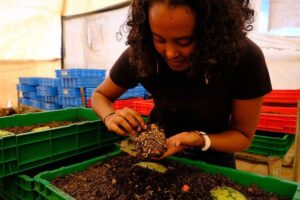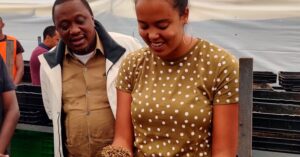On the occasion of the International Women’s Day, we have an interview with Talash Huijbers, a young innovator. She is 26 years old, she grew up in Kenya on the farm run by your Dutch father and Kenyan mother. She learned about the potential of insects while studying International Food and Agribusiness at HAS University of Applied Sciences in Netherlands. And in November 2018, she set up an insect farm in Kenya, near Nairobi, InsectiPro, which now employs 78 people and makes a profit, combining profitability and sustainability.
Did your company seem a bit crazy to people at the beginning?
It didn’t seem a bit crazy, it seemed very crazy to a lot of people. I mean, it’s a completely different way of farming, when you are farming insects, you’re not farming cows or chicken or something that everybody knows. So everybody thought that it was just a bit very crazy in the beginning. How do you want to work with garbage? How do you want to work with insects? It’s been a very interesting journey.
Could you explain, in a few words, how does your insect farm work, help us better visualise the different stages of your production and understand how do you combine sustainability and profitability?
We have two different types of insects. The black soldier fly for animal feed and crickets for human consumption. They’re both very interesting insects. The black soldier fly is special, because it takes organic waste, so everything, food waste, market waste, kitchen waste are converted into high value protein and fertiliser. The Black Soldier Fly is a small, tiny black fly that has no mouth when it’s an adult, so it can’t spread diseases, it only lives for seven days in sunlit areas, that’s why they’re considered safe. The fly will then make an egg. In around two to five days, the egg has hatched, and once the egg has hatched it just keeps on eating the waste being collected around Nairobi. The black soldier fly will eat and eat and eat, and 10 days later, it is now a very big insect. Then we harvest them, we dry them, and then they go off to animal feed. Apart from this, their poop makes also very good fertiliser. So you get two made products from the black soldier fly. For the crickets, it’s the same thing. The cricket makes an egg. We grow it for five weeks. Five weeks later, before it gets its wings, we’re able to harvest them. We freeze them, we microwave them, and then they’re very nice, crunchy, snacks. So crickets go as a snack product, but also as a powder into local products such as uji, which is porridge for human nutrition. Therefore, we are at the intersection of sustainability and profitability because we do a lot with circular economy, and then we make sure that our circular economy is profitable so we can keep on doing what we’re doing.
And how did the COVID 19 pandemic give you a project a boost?
COVID was very good for my company, actually, because the borders were closed, it was very difficult to get food in, and food was taking a lot longer to enter the country. Feed became scarce, especially for products such as fishmeal and soya that the black soldier fly was replacing. So, demand for the black soldier fly skyrocketed, and every kilo we can produce now is already sold. The good thing also about COVID is that it forced us to diversify. Before we only had three main waste sources, and now we have 17 places where we collect waste.
How do you manage this supply of organic waste?
A small portion of it is market waste, but a lot of it comes from industrial processing. So when people are making fruit juice, the leftovers of the orange peel, the passion fruit peel, the pineapple peel, the mango pulp, we collect a lot of that. We’re also able to process a lot of beer waste.
How many tonnes do you recycle per day?
Per day, we do 30 tons of organic waste. Nairobi produces between two thousand five hundred to three thousand tons of waste per day. So we are just making a small part of it.
Are there other companies doing this, contributing to that recycling or you are quite a few in that sector?
There’s another very big company there, called Sanergy. They are based on the other side of Nairobi, they work a lot with human waste, with poop and they’re able to use a black soldier fly to convert human waste into usable protein and usable fertiliser. And then apart from that, they’re smaller companies here and there.

And what do you think it takes to get into this type of production? What are the key success factors and the obstacles to overcome to make a living out of this business and make it grow?
Patience first, yeah, yeah. Yeah, at the end of the day, they are animals. Sometimes it can take 10 days, or sometimes it can take 12, and because it is such a new industry, there are no developed, you know, standard operating procedures. Everybody is still being very secretive about their machines. So patience is definitely a big one because you have to kind of figure out everything as you go along. So every day is different, because we’re always coming up with new innovations, new efficiency. And then also, you know, definitely waste is very important, as we recycle lots of waste. That’s a very key input. So patience and waste are factors number one and number two.
Is insect farming a job for the future, even for smallholder’s farmers and women?
If you look at the southern region of the world, a lot of people already eat and farm insects. It’s just not commercialised as well. So for example, if you look at Uganda, there’s a street snack called nsenene made of grasshoppers. So what they do is they wait a few times a year. The grasshoppers swarm. They catch all of them and then they cook them. If we’re able to turn that into a farming method, you’re creating a lot more new jobs for an industry that already exists. But then you also, yeah, different streams of income for people. So the good thing is with the black soldier fly or the crickets, it’s not space intensive and it’s not that hard, once you have an egg. So the same thing with chickens. So in this region of the world, a lot of people don’t hatch the eggs. They buy a one-day-old chick. It will just be a central point where they can be able to buy them and then farm them at home. The advantage with smallholder farmers is that they can feed them directly to their animals. So you have pigs and chickens, you can grow BASF using your kitchen waste and then feed that directly to your animals as a protein-rich food..
So it’s an entire circular economy and business. And it can be made at small scale?
We tested it at small scale. We’ve worked last year with six hundred and fifty farmers, testing how do we take our big model and then make it for a smallholder farmer.
And it did work. It’s what you’re saying, some people can succeed in that.
Some models works really well, especially the models where we were supplying the eggs. But when farmers had to grow their eggs themselves, it didn’t work. So again, like I said, it’s a new industry. Everything is still a learning process. So now we know if farmers want to do it, we have to be able to supply them with eggs to do it.
… and to support them also, to bring some some other kind of support too?
Yes, we do a lot of training. Actually, last week, my team trained 83 farmers on the Black Soldier Fly. If they were to go to training, they can also go to ICIPE. ICIPE offers week-long trainings. They also offer free start egg kits. Our first insects came from ICIPE, the International Centre of Insect Physiology and Ecology, and they’re very useful. So there are a lot of resources out there, if you want to start by yourself. But we also make sure to offer a full support package to the farmers that we work with.
What next steps do you have in mind and what are the main obstacles to adoption of insect food by human?
So like I said, we have a second insect, the cricket that is for human consumption. So that is what we’re working on right now. How do we make this an attractive product for people? So there are two ways you can hide it in other products , add it in powder. You put it in porridge, you put it in a pancake, that kind of stuff, or you can just make a really attractive, super fun packaging. You go around. We host a lot of tastings, we go around. We tell people ‘Hey, just taste one’. So how we’re making more attractive is we’re adding flavour to this. One is caramel cinnamon. Another is salt and vinegar. We have a barbecue flavor, just to play around and show people, OK, this is a normal food. This is like popcorn, but healthier because it’s very high in protein, iron and zinc. We really push the nutrition standpoint first. And then if it’s fun, then people buy into the idea a lot more.

Did being a woman make it difficult for you to start and grow InsectiPro?
Definitely, first of all, we’re in Kenya where the culture is very macho. Second of all, agriculture is considered a male dominated field at the higher levels. Third of all, I’m young, so it’s every factor that you can think to work against you, works against you. We want with Insectipro to show people that, yes, even though we are young women, we can do it. So, on my management team, there are three boys and five girls, and our average age of management is 28. Myself, I’m 26 and the oldest is thirty three, so we’re doing very well in those metrics.
And what could be done, according to you, to allow women’s talents to be better expressed in research and innovation in Africa, for example?
More PHDs directed at women. Women need to be given the same or the same kind of opportunity as men. So I don’t know exactly how that can be done, but it’s like working. So when we give products to ICIPE, we’re very clear that we want a woman, PhD student, to run that project. So companies can be the ones asking these institutions who run research to hire more women or to work with more women who are PHD students. Because after that, then it’s a lot easier for the companies to hire those women that they worked with.

(Talash Huijbers, showing the president of Kenya, Uhuru Kenyatta, how insect farming works)
And what are women’s assets in this field that should be better valued according to you too?
You need a lot of details to go into what you’re looking at. So definitely detail orientation would be my first answer to that.
And just to conclude our interview on the occasion of International Women’s Day, what message would you like to send to the women, researchers and innovators of the African, Caribbean and Pacific countries?
We see you we see all the good work that you are doing. We are very excited about where we’re going in the future with women and definitely mandate more that women should be able to work in these fields and should be given the Ph.D. positions.
